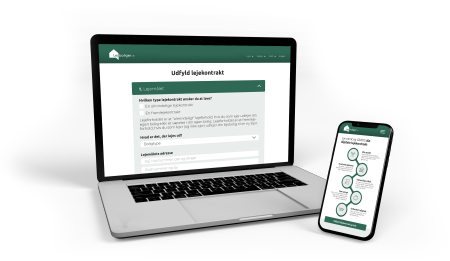Make the perfect rental application

In this article, we will take you through some steps that you as a tenant can follow when you write your application. It will make the whole process easier for both you and the landlord. And if there's one thing a landlord likes, it's saving time. For that reason it is important that you convey the most important information about you and why you are a good 'match'.
If you write to a landlord via BoligZonen's message system, the landlord has the opportunity to check out your profile. On your profile, you can elaborate more about yourself and in this way give the landlord an even better insight into who they can potentially get as a tenant.
What the landlords are looking for is a tenant who causes as little trouble as possible. Someone who is not going to move in six months or a year. And then the landlord wants to make sure that the potential tenant is not going to get complaints from neighbors and pays rent on time. You can therefore advantageously write in your application that you are looking for a home for the next several years, respect your neighbors and have control over your finances.
In your housing search you will likely come across different types of landlords. Namely the private landlord and the professional landlord. It is not completely irrelevant in relation to your housing application which of these two you write to. For the professional landlord we would recommend that your application be short and precise, as there is usually no time to read long applications. Conversely, the application to the private landlord often has to be a little longer. This is often because the landlord rents out his own home or a room in it and therefore cares more about which tenant they get into their home.
Below we will take you through some steps so that you are fully prepared to write the perfect housing application.
Step 1: Think of your housing search as a job application
Just like when you apply for a job, it is not enough to write two sentences and expect to be considered for the job. Sentences like "I'm interested in the property" or "when can I see the property" will not be enough if the landlord is to take you seriously.
Instead, you must write a motivated application - just as you would always write a motivated job application. Tell the landlord about yourself and your partner or friend, if you are two people applying. Mention things that are relevant to the landlord and give the impression that you are a serious tenant. A way to show this is, for example, to write about your work, marital status, pets, whether you smoke, etc.
Remember that the landlord has never met you, but wants to form an impression of you. It is difficult in writing, so you have to make an effort.
Step 2: Document your payment options and any recommendations
As we touched on earlier in the article, one of the most important parameters for the landlord is that you can pay your rent.
Be ready and have documentation for the possibility of payment ready. This gives the landlord peace of mind - both because he/she can see that you are able to pay, but it also gives the impression that you are a person who has it under control.
If you have been a tenant before and have either received or can obtain a recommendation from there, it is a huge plus for the landlord. The landlord thus knows for sure that you have been a good tenant in the past and will probably be again.
Step 3: Avoid using clichés
"If you choose me as a tenant, you will find that I am calm, responsible, respectful and mature" - can you hear how that sounds? It very quickly seems impersonal and something that anyone could write. Instead, write about situations where you have actually been responsible or similar. It could, for example, be that you stayed in your old apartment, until the landlord had found a new tenant because you wanted to help him/her so that they were not left without a tenant for a period of time.
Write something so the landlord can remember you after reading 47 other applications.
Step 4: Do not reuse housing applications
It is important that you do not send the same application to different landlords. It is easy to spot if the application is not written exactly for that specific landlord - and for that reason alone you risk getting to the back of the queue.
So if you have to apply for four different homes, you must write four different housing applications.
Step 5: Don't spend time on homes that don't match your criteria
Before you start writing your housing application, read the landlord's housing advertisement carefully. You are wasting both your own and the landlord's time if you want to find housing that allows pets, when the housing ad states that pets are not allowed. If you have made a budget in advance and know you have DKK 6,000 for rent, then there is no reason to write to a landlord who rents housing for DKK 7,500.
The landlord is not going to change his mind about pets or the amount of the rent. So make sure that the landlord's criteria match yours before you write.
Step 6: Always apply on your own behalf
We see more and more often that e.g. parents write on behalf of their children. Don’t do that. It does not seem as if the person who will live in the home is particularly responsible. Our experience says that these types of housing applications are very quickly sorted out by the landlords.
Finally, we would like to urge you to use your common sense in your home-hunting. We have written an article about how you can avoid being cheated by fake landlords. We would recommend that you read it before you start your housing search.




